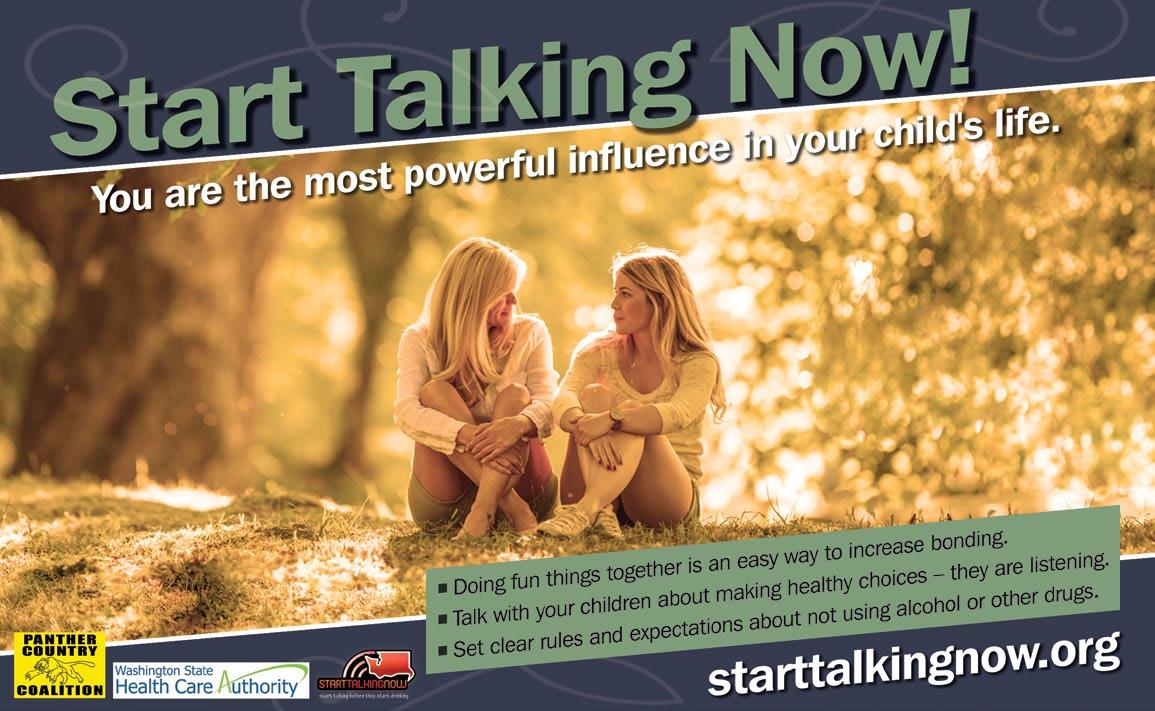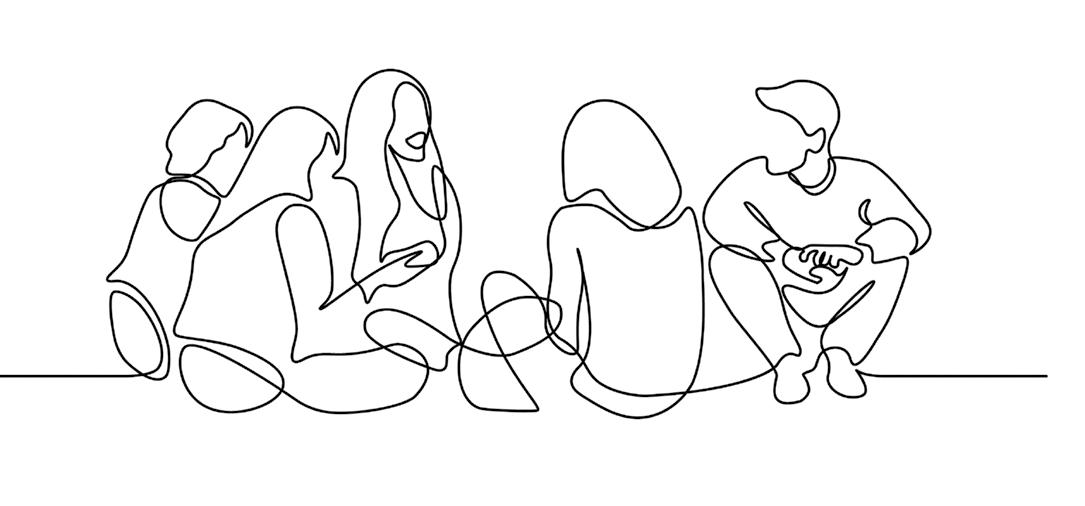
9 minute read
Start Talking Now
Preventing Youth Substance Use - You are the #1 Influence!
by Donna M. Kelly, CPWI Coalition Coordinator Panther Country Coalition & Cusick Youth Coalition
Advertisement
The key reason kids give for not using alcohol, marijuana, or other drugs is that they do not want to disappoint their parents (Monitoring the Future survey). Parents can truly make a difference by talking to their teens about the risks of underage use. It is not uncommon for teens to act like they are not listening to you but in fact they are! Even though they may walk around with headphones on 24/7 do not assume they are listening to music at high volumes and not overhear you or that what you say is not being taken to heart, because many times it is. Kids are listening and paying attention. They also want to be happy, make you proud and live long healthy lives. One way to help them is by talking early (by 6th grade) and often about the consequences and risks of underage substance use.
What are the risks of underage use of alcohol, marijuana, and other drugs?
Early use of alcohol, marijuana, and other drugs puts teens at greater risk for addiction and other health problems such as failing in school, and limited career choices by arrests and lack of education. These substances can impair areas of the brain that control motor coordination, impulse control, memory, learning and judgment. Because the teen brain is still developing, it is more vulnerable than an adult’s brain to the effects of alcohol, marijuana, and other drugs according to the National Institute on Drug Abuse (NIDA).
The Centers for Disease Control and Prevention (CDC) reports underage substance use is associated with the top three causes of teen deaths: accidents (including traffic fatalities and drowning), homicide, and suicide. Over eighteen-hundred college students deaths each year are related to underage drinking according to the National Institute on Alcohol Abuse and Alcoholism.
Teens who drink and use other drugs are more likely to engage in risky behaviors like sex. Such behavior can result in pregnancy, AIDS, and other sexually transmitted diseases (CDC).
Kids who drink before age 15 are 4 times more likely to develop alcohol problems as adults (Center for Behavioral Health Statistics and Quality 2015).
How can I prevent my child from using alcohol or marijuana?
Parents and caregivers have the greatest influence on a child’s decision about alcohol and other drugs. Research consistently shows that kids who learn a lot about the risks of alcohol and other drugs at home are 50% less likely to use, yet many parents find it difficult to talk about this.
In fact, in Pend Oreille County over half of the parents (54%) have talked to their 10th graders about not using alcohol and marijuana according to the WA state 2018 Healthy Youth Survey.
Local youth substance use is increasing as noted in the 2018 Pend Oreille County Healthy Youth Survey that reports 25% of 10th graders reported using marijuana in the past 30 days where as in 2016 it was only 20%. Alcohol trends are similar. In October of 2016, 26% of Pend Oreille County 10th graders report current use of alcohol and that is up from 18% in 2014. Parents are needed now as much as ever to help their teens make healthier choices.
Tips for parents
• Create healthy substance free a rites of passage to adulthood • Set clear rules against using alcohol, marijuana, and other drugs • Help your children deal with peer pressure and stress • Be a good role model - show kids you don’t need a drink to relax or celebrate
• Talk with them early and often about the ways alcohol and marijuana can harm them, ask questions and be a good listener • Stay involved in their lives • Know who their friends are, and where they are going
Create close bonds with your children
Children are less likely to drink, use marijuana or other drugs when their parents are involved in their lives and when they feel close to their parents. Family conflict and lack of bonding increase the risk of drinking and marijuana use.
To increase family bonding: • Give kids at least 15 minutes of one-on-one time every day • Do fun things together • Give positive feedback about the healthy choices your child makes • Eat as a family five times per week
Set clear boundaries for your children
Set clear standards early and talk about the rules often.
To set boundaries: • Help your child practice ways to say no to drugs • Use fair and consistent discipline any time your standards are broken • Help your kids have positive relationships with peers
Monitor your child’s interactions
Always know what your kids are doing. Help them plan safe and fun activities.
To monitor your child, ask these five questions when she or he spends time with friends: • Where are you going? • What will you be doing? • Who will be with you? • When will you be home? • Will there be alcohol, marijuana or other drugs?
An excellent multi-lingual online resource for parent-child communication is StartTalkingNow.org, sponsored by the Washington Healthy Youth Coalition.
The Panther Country Coalition is a local resource in Cusick, WA with a mission to prevent and reduce youth substance use. We offer evidenced-based parenting programs, Sport Prevention and Wellness, a health promotion program that highlights the positive image benefits of an active lifestyle to reduce the use of alcohol, tobacco and drug use by high school students, free parenting workshops, and leadership opportunities for students involved in our youth coalition. The Panther Country Coalition is funded by the Washington State Health Care Authority. Please contact us today for more information at 509-447-6416, email dkelly@pendoreille.org or visit StartTalkingNow.org
Donna Kelly, CPC, is a Certified Peer Counselor with over 7 years of substance abuse prevention experience working with local and community coalitions. She is a Certified Parent Workshop Facilitator. Donna is currently employed by Pend Oreille County Counseling Services as the Community Coordinator for the Panther Country Coalition.

She Had Nowhere
by Roberta Romero, Development Manager, Peer Spokane
to Turn


It may have been 34 years ago, but Georgia Butler can clearly remember when she had nowhere to turn. A Spokane native, she found herself in Texas, a single mom struggling with mental health and substance use challenges.
With help, she got sober and returned to her roots in Spokane. At that time in 1991, she learned firsthand how difficult it is to find support for people who are struggling with addiction or mental health and most likely both, “I was sober, but I couldn’t find a rental, quality child care, it was a daily struggle,” says Butler.
Butler focused on her sobriety and education. While working odd jobs, she got her degree in applied psychology and women’s studies. Armed with both book knowledge and lived experience, she was ready to get to work.
She learned how vital a genuine connection is for people suffering from behavioral health issues, beginning her career working with women and their children, then moving into treatment counseling. “Sharing my own story resonated with people, and I learned that shared lived experience is what makes a huge difference in success,” says Butler.
After building an acclaimed reputation as a recovered sober leader, opening nonprofits, and reducing mental health and addiction stigma, Butler wanted to do even more. “I knew that the Spokane Valley needed support with a deep commitment to community and to helping others,” says Butler. So at the age of 64, she helped officially open Peer Spokane.

Peer Spokane is a program of Peer Washington, a nonprofit founded in 1984, which is peer-led, peer-run, and dedicated to providing emotional support and development services to adults with mental health, addiction, and/or HIV/AIDS. “I’m so proud to be the Director of Peer Spokane. With a well-established successful program, we are already making a difference in the Spokane Valley. It’s the peer-to-peer, shared lived experience that bridges the gap,” says Butler.
And the need could not be higher. According to the Washington State Department of Health COVID Report, the pandemic has caused a surge in behavioral health symptoms across the state. Butler adds, “Rural areas in our area are particularly vulnerable and less likely to have access to high-quality care.”
Peer Spokane can help fill that need. Led by trained employees who identify as peers, they help people navigate everything from treatment access to employment to housing. Peer support groups are offered as well as an open door and open heart. Butler says, “We offer a space even if you are unsure of what you want or can do, there is no judgment, and every employee and volunteer has lived experience with mental health or addiction or both.”
One of the most significant barriers to getting help is also eliminated by Peer Spokane; all of its services are FREE. “There are people seeking support who have never asked for help for addiction, trauma, or mental health before; we are here to be that first safe place to start on the road to recovery,” says Butler.
Peer Spokane celebrated its first anniversary in September 2020, a year like no other, with COVID closures, but that did not stop Butler and her team. They continued to work online and have now returned to seeing members in the office while following CDC safety guidelines. Butler is grateful to see people again; she says, “The best part of my job is standing in the lobby when someone walks in for the first time, and I can say, ‘How can I help you?’”

If you need help or would like to learn more about Peer Spokane, go to our website peerspokane.org.
Roberta was born and raised in Albuquerque, New Mexico. She moved to Seattle in 1992 for a reporting job at KING 5 (NBC) news. She spent the next two decades covering major news events in Washington state. While working as a full-time reporter and raising three kids with her partner, her alcoholism was activated. She was lucky enough to find treatment and is now in long-term recovery. Roberta is passionate about helping disenfranchised people and others to get help and is especially focused on meeting people where they are. She believes deeply in the peer-to-peer model and has seen its benefits work on many levels. She has a unique skill set to help tell stories and get messages across to a wide audience. She enjoys spending time with her son, twin daughters, and husband. (but secretly, her favorite is her dog, Abby.)










